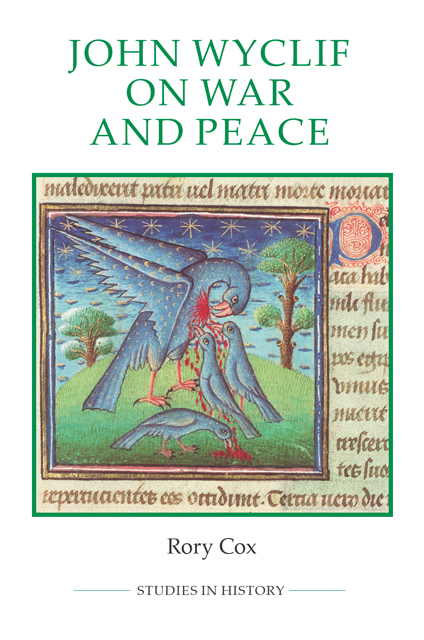Book contents
- Frontmatter
- Dedication
- Contents
- Acknowledgements
- Abbreviations
- A note on the chronology of Wyclif’s Latin works
- Introduction: War, peace and Wyclif
- 1 The development of just war doctrine up to the fourteenth century
- 2 Wyclif’s rejection of just cause
- 3 Wyclif’s rejection of proper authority
- 4 Wyclif’s rejection of correct intention
- 5 Wyclif on politics
- 6 The medieval pacifist
- Conclusion
- Bibliography
- Index
- Frontmatter
- Dedication
- Contents
- Acknowledgements
- Abbreviations
- A note on the chronology of Wyclif’s Latin works
- Introduction: War, peace and Wyclif
- 1 The development of just war doctrine up to the fourteenth century
- 2 Wyclif’s rejection of just cause
- 3 Wyclif’s rejection of proper authority
- 4 Wyclif’s rejection of correct intention
- 5 Wyclif on politics
- 6 The medieval pacifist
- Conclusion
- Bibliography
- Index
Summary
It has been observed that ‘philosophers have written about war for as long as there have been philosophers’. This might be because many philosophers have lived through periods of conflict, but it is also because war presents a moral conundrum. In many senses, war alters the moral and legal framework that helps to shape normal interactions within human communities. Killing fellow human beings, an act considered unlawful within most societies, is suddenly made licit and undertaken on a potentially grand scale. Indeed, not only is the legal status of killing transformed from unlawful to lawful, its moral status is transformed from immoral to morally acceptable, even praiseworthy.
This contradiction between the morality of everyday life and the morality of war remains a fundamental tension within just war doctrine to this day. This tension was only exacerbated when, roughly between the third and fifth centuries ad, classical ideas of justified violence began to be combined with an essentially non-violent Christian theology. Nevertheless, Christianised just war doctrine enjoyed widespread acceptance in the West after c. 400 and, as a result of the West’s dominance of international politics since the eighteenth century, has continued to influence deeply modern concepts of justified violence and international law. The reason why Wyclif’s treatment of war is so fascinating and so important is that, against the crushing weight of tradition, Wyclif argued that there could be no such thing as a Christian just war.
The magnitude of this conclusion should not be underestimated. When Wyclif was writing, the concept of justifiable Christian war had reigned unchallenged in Latin Christendom for a millennium. Some thinkers had been highly sceptical of the praxis of such a theory and the unrealistic demands placed upon the ‘just warrior’, but no one had constructed a convincing argument against the possibility, or the desirability, of just wars. Wyclif’s denial of the existence of ‘just causes’ to wage war, his removal of human authority to wage war, and his refusal to accept that charitable intentions could produce warlike actions, was genuinely revolutionary in terms of medieval attitudes to war and violence. By challenging just war doctrine and morally condemning war, Wyclif occupies a unique position in military history.
- Type
- Chapter
- Information
- John Wyclif on War and Peace , pp. 165 - 170Publisher: Boydell & BrewerPrint publication year: 2014



